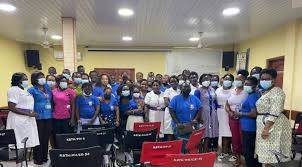From Dallas to Tamale: The Nurses Who Traded Comfort for Compassion
-I’ll never forget the look on my auntie’s face when she returned from her yearly visit to the North. She’s a retired nurse and always says, “Up there, healthcare feels like a luxury, not a right.†I remember her telling me about a small girl with a swollen stomach, walking barefoot for miles just to be seen by a nurse—just seen.
That image stuck with me.
So when I heard that the Ghana Nurses Association in Dallas-Fort Worth (GNA-DFW) was heading to Tamale on a medical mission, my heart actually skipped a beat.
Not because it was new.
But because it was needed.
And let me tell you—this wasn’t just a “hand over a few boxes of gloves and bounce†kind of mission.
These are Ghanaian nurses living abroad—people who’ve built lives in the U.S., who could easily stay in their safe bubbles and send money home when they feel guilty. But instead, they came back. In person. With stethoscopes, medicine, screening kits, and more than anything, their hearts wide open.
They showed up.
In Tamale.
In the heat.
In the dust.
In the overwhelmed clinics and underserved communities that most of us scroll past when watching local news.
And they didn’t just do it for the claps or the photo ops—they did it because they remember. Because many of them are that little girl from the North, or that boy who had to wait six months just to get malaria medicine. Because they know that sometimes, just being there—listening, checking, comforting—can change someone’s life.
Let’s be honest: healthcare in Ghana is still a maze of “go and come,†“no beds,†and “try this drug store instead.†If you’re lucky, you’ll find someone who actually cares. If not, you might end up in a plastic chair outside the ward, praying someone notices you.
So when diasporan health workers return—not for vacation, but to serve—it’s not just noble. It’s powerful.
I’ve noticed something lately: when Ghanaians abroad come home, they often bring things the country needs—not just gadgets or foreign cash, but perspective. They see what’s possible because they’ve lived it. And they want others to taste it too.
And look, I’m not saying this one mission will fix Ghana’s health system. It won’t.
But it’s a spark.
A reminder that healing doesn’t always start in Parliament—it starts with people. With Ghanaians who refuse to forget their roots, even when they’re thousands of miles away.
-Here’s what I’m wondering though:
What if this became normal?
What if every Ghanaian nurse abroad partnered with a local clinic every year?
What if our diaspora stopped waiting for permission—and just showed up like this?
Would we finally start closing the gap between what Ghana has and what Ghana deserves?
I don’t know. But I do know this: in a world that often feels numb and self-absorbed, these nurses did something radical.
They cared. Loudly. Boldly. And with open hands.
And that’s a kind of medicine we all need more of.




No comments yet
Be the first to share your thoughts!